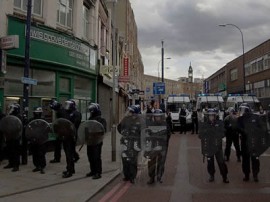
Three successive nights of rioting in London have peeled the skin off the urban London and revealed something beating and ugly beneath. Shops and vehicles have been destroyed in several different boroughs, with reports of people injured and even killed.
Commentators are falling over themselves to analyse why London’s streets have dissolved into lawlessness – is it the cuts, or years of politically correct policing, or a lack of parental authority and control? – but this blog is content simply to observe that they have.
There have been complaints that there have been insufficient police on the streets to prevent trouble – the government announced today that there will be 16,000 on duty tonight, compared with 6,000 the previous night – but London has 7,000 pubs and more than 20,000 shops. There are simply not enough police to protect every commercial premises in the capital.
But does that mean that continued rioting is inevitable? Why is there not more rioting in London anyway, if the police cannot really prevent it? There is always a tendency to try.
The answer is that while the rule of law depends on enforcement, it also depends on observance. It is based not on the police and the courts and the prisons alone, but also on a sense among the people that this is the best way to live, to respect other members of the community, their lives and their property.
The rule of law is not an achievement, something that is done and then completed. No, it requires a continuing effort at maintenance, to instil its values in each generation, and to refine and improve it. It would be very easy to sink back into the bad habits of earlier times, if we do not defend our peaceful way of life today. (See here how the murder rate has declined over the centuries.)
Politicians sometimes divide issues into those about process and those which deliver outcomes. Outcomes are fashionable, processes are a distraction. The rule of law is one such process issue, but the wreckage of Clapham, Hackney and elsewhere tells us how important it is in its own right.
If we don’t get our political system right, all the other things we are trying to use politics for are put at risk. As has been observed elsewhere,
It takes just a few days to destroy the results of decades of common effort to increase the general well-being.
It is time to renew that common effort, with perhaps a clearer understanding of the importance of the rule of law and how fragile it is.
